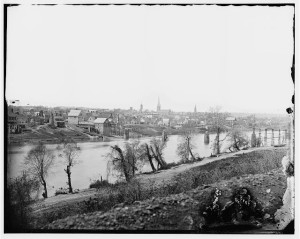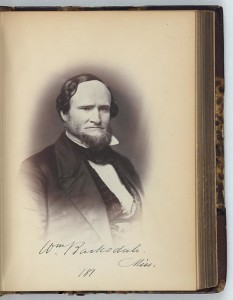Americans are fortunate that we mostly have “free and fair” elections. 150 years ago yesterday the people of Fredericksburg, Virginia apparently relied on Confederate troops to ensure that the Yankees on the other side of the Rappahannock did not try to interfere in a municipal election.
From the Richmond Daily Dispatch March 18, 1863:
From Fredericksburg.
[from our own correspondent.]
Fredericksburg, Va., March17, 1863.
Fredericksburg has again uttered her denial to the insolent foe of allegiance to the United States. Hooker is sent to seize her, after Burnside’s brief, brutal, and inglorious three days occupation, and appoint officials to administer her government. But to-day, at the legally appointed period designated by her charter, her citizens have chosen her municipal officers for the ensuing year. Protected by Barksdale’s Brigade, under the very guns of the Yankees, this election was conducted with unusual quiet and order M. Slaughter, Esq., who for several terms, and especially during the war; has discharged the onerous and important outles of the office with honor and credit to the community and himself, was re-elected Mayor; W. A. Little, Recorder; and L. J. Huffman H. B. Hall. Geo. W. Eve, Dr. J. G. Wallace, John F. Scott. J. G. Hurkarf, D. H. Gordon, Jno. M. Herudon. Jno. A. English, and James McGaire, were chosen Common Councilmen.
The Mayor was serenaded at night by the admirable Band of the 13th Mississippi regiment, whose leader is Prof. T. D. Nutting, who performed several beautiful airs and were thanked by the Mayor both as soldiers and musicians. Gen. Hooker can get a serenade or reveille whenever he chooses from several bands of Mississippians and others here, who will let him hear the music of their rifles and the roar of their artillery as soon or late as he is ready for the racket.
In this connection, let me say that the music I heard at the last performance by the “Barksdale Thesptans and Europeans.” at which Prof. Nutting’s Band and the Glee Club of the Richmond Howitzers, led by Prof. Crouch, performed, was as exquisite as any I ever listened to. I did not hear at all, but one piece reminded me of Tennyson’s.
“Music, that gentler on the spirit lies
Than tired eyelids upon tired eyes.”
And another was soul-stirring, as Comus says. “to create a soul under the ribs of death. ” The army and the audience appreciate the high standard they have introduced in their entertainments. The afterpiece.–“The Recruit”–I did not hear, but understand that Briley and his fellow actors “brought down” the curtain as well as “the house.”
As a young man William Barksdale was an “editor of the Columbus [Mississippi] Democrat, a pro-slavery newspaper”. He fought in the Mexican War and later was elected to the U.S. House where he “achieved national prominence as a States’ rights Democrat, serving from March 4, 1853, to January 12, 1861. He was considered to be one of the most ferocious of all the “Fire-Eaters” in the House. During the war Barksdale assumed brigade command during the Peninsula campaign. At Fredericksburg in December 1862 his snipers harassed Union pontoon-builders until the Mississippians were driven out of the city.
In addition to securing the municipal election it is said that “Barksdale’s Brigade was alerted” to the action at Kelly’s Ford.
Fredericksburg’s mayor, Montgomery Slaughter, was involved in negotiations with Union General Sumner in November 1862 over the surrender of his city to the Yankees.


